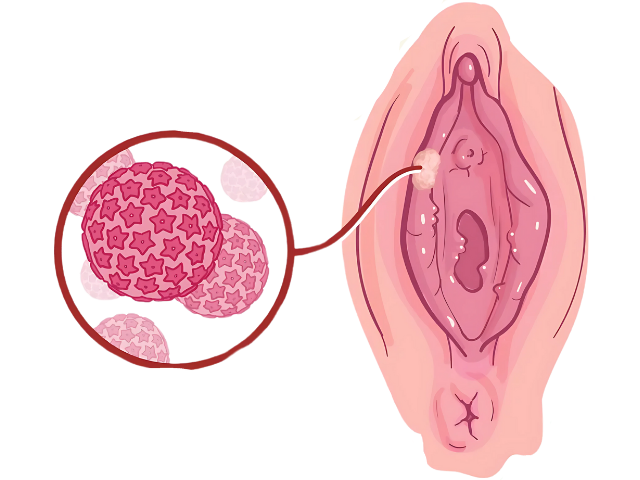Get the best Vaginal Wart Removal Treatment at KK Virat Hospital, Karimnagar with expert gynecologists. We offer safe, effective, and confidential treatment options to help you regain your health and confidence.
About Vaginal Wart Treatment
Vaginal warts are soft growths that appear inside or outside the vaginal walls. These warts are the most common type of sexually transmitted infection (STI) caused by the Human Papillomavirus (HPV), particularly HPV types 6 and 11. They can appear as small bumps or have a cauliflower-like texture, often matching the color of the skin.

Commonly Affected Areas
- Inside and outside the vagina
- Vulva and cervix
- Anus and perianal region
- Groin area
- Penis and scrotum (in male partners)
Symptoms of Vaginal Warts
- Small, flesh-colored or grey growths in the genital area
- Itching or discomfort
- Bleeding during intercourse
- Increased vaginal discharge
- Pain or tenderness in the affected area
Diagnosis of Vaginal Warts
A gynecologist at KK Virat Hospital will conduct a thorough diagnosis using:
1. Visual Examination
The doctor inspects the external genital area for visible warts.
2. Pap Smear Test
This test helps identify abnormal cervical cells caused by HPV and detects early signs of cervical cancer.
3. HPV Test
Recommended for women over 30, this test detects high-risk HPV strains linked to cervical cancer.
4. Biopsy
If required, a small tissue sample is collected for lab analysis to confirm the diagnosis.
Treatment Options for Vaginal Warts
At KK Virat Hospital, Karimnagar, we offer two main treatment options:
1. Medications (Topical Treatments)
For small vaginal warts, prescription creams and solutions are used, such as:
- Imiquimod (Aldara) – Enhances immune response to fight warts.
- Trichloroacetic Acid (TCA) – Destroys wart tissue.
- Podofilox (Condylox) – Stops wart growth.
2. Laser Treatment for Vaginal Warts
For larger or persistent warts, laser therapy is recommended. This procedure:
- Is a quick and safe outpatient procedure.
- Uses an intense beam of light to remove warts.
- Is performed under local anesthesia.
What to Expect During Laser Wart Removal?
- The procedure takes 30-45 minutes.
- You may experience mild discomfort, which is managed with anesthetics.
- Minimal downtime; you can resume daily activities in 1-2 days.
- No scarring or major side effects.
Post-Treatment Care and Recovery
- Avoid sexual intercourse for 3-4 weeks.
- Maintain proper hygiene and avoid excessive moisture in the genital area.
- Do not scratch or irritate the treated area.
- Follow up with your doctor for regular check-ups.
Preventing Vaginal Warts in the Future
- Get vaccinated for HPV (Cervarix or Gardasil).
- Use protection (condoms/dental dams) during intercourse.
- Limit multiple sexual partners.
- Maintain good genital hygiene.
- Go for regular gynecological check-ups.
Why Choose KK Virat Hospital for Vaginal Wart Removal?
- Confidential Consultation: 100% privacy maintained.
- Experienced Female Gynecologists: Skilled doctors with years of experience.
- Advanced Laser Treatment: Minimally invasive and effective.
- Post-Treatment Support: Follow-up consultations.
Book Your Appointment Today
At KK Virat Hospital, Karimnagar, we ensure safe, private, and effective treatment for vaginal wart removal. Our expert gynecologists use state-of-the-art technology to provide the best care for your sexual health.
- Call Us Directly: Get in touch with our medical coordinators to schedule an appointment with an expert Gynecologist.
- Direct Visit: You can visit our hospital directly by carrying your previous medical records if you have a medical history. However, admission will be based on the doctor’s recommendation.
What causes vaginal warts?
Vaginal warts are caused by certain strains of the Human Papillomavirus (HPV), particularly HPV types 6 and 11. These strains are transmitted through sexual contact, including vaginal, anal, or oral sex with an infected partner.
How common are vaginal warts?
Vaginal warts are one of the most common sexually transmitted infections (STIs). According to health reports, a significant percentage of sexually active individuals will contract HPV at some point, with genital warts being a possible symptom in some cases.
What are the risk factors of vaginal warts?
The risk factors for vaginal warts include:
- Direct skin-to-skin contact with an infected person
- Unprotected sexual activity
- Having multiple sexual partners
- Weakened immune system
- History of other sexually transmitted infections (STIs)
Are there any natural remedies for vaginal warts?
While some people try home remedies like tea tree oil, apple cider vinegar, or green tea extracts, these methods are not scientifically proven to be effective. Medical treatments such as topical medications, cryotherapy, or laser removal are recommended for safe and effective wart removal.
Are vaginal warts curable?
Vaginal warts can be treated and removed through medications or medical procedures such as laser therapy or cryotherapy. However, since HPV remains in the body, there is always a risk of recurrence. Vaccination and preventive measures can help reduce the chances of reinfection.
Are vaginal warts and skin tags the same?
No, vaginal warts and skin tags are different. Vaginal warts are caused by HPV and appear as small, fleshy bumps, sometimes in clusters. Skin tags, on the other hand, are benign growths of excess skin and are not caused by a viral infection.
Does vaginal warts affect my chances of getting pregnant?
In most cases, vaginal warts do not affect fertility or the ability to conceive. However, large or untreated warts can cause complications during childbirth, which is why treatment is recommended before pregnancy.
Is laser treatment for vaginal warts safe for pregnant women?
Yes, laser treatment is considered safe for pregnant women if necessary. However, treatment options may vary depending on the size and location of the warts. A gynecologist will evaluate the condition and recommend the safest approach.
How long do vaginal warts last?
Without treatment, vaginal warts can persist for months or even years, as HPV remains in the body. With proper treatment, warts can be removed within a few weeks, though recurrence is possible.
Which doctor to consult for vaginal warts treatment?
A gynecologist or a dermatologist specializes in the diagnosis and treatment of vaginal warts. Some cases may also require consultation with an infectious disease specialist if HPV-related complications arise.
Where are vaginal warts usually treated?
Vaginal warts can be treated at specialized gynecology clinics, dermatology centers, or multi-specialty hospitals that offer STI treatment services.



